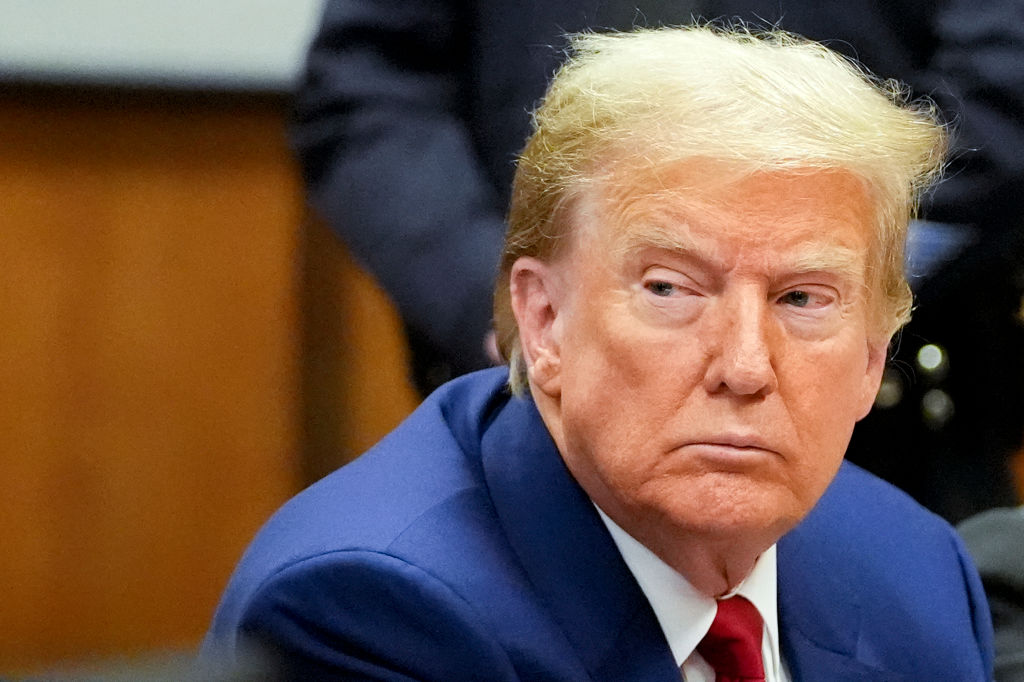
On the cusp of a financial crisis, Donald Trump got help from an unlikely source: His struggling social media platform. Investors approved a plan on Friday to take Truth Social public, increasing his net worth by billions as he’s drowning in legal expenses and owes New York state half a billion dollars in a civil fraud case. The company started trading on the Nasdaq exchange on Tuesday.
But the financial statements of Trump’s firm show scant evidence of a booming business worthy of the $4.7 to $5.6 billion market capitalization reported on Monday. Trump Media & Technology Group, which owns Truth Social, lost money last year, according to regulatory filings.
The company’s trajectory has led many to wonder how it could have scored such a high valuation. To close observers of American finance, it’s less a sign that Wall Street investors are buoyed by Trump’s social media platform than they are bullish on his chances of returning to the White House.
“It's a barometer for how he's doing in the election,” says Kristi Marvin, the finance guru who founded SPACInsider. “There are definitely people who like Trump and want to support him. They're probably buying the stock. And there's probably other people thinking: If he wins the presidency, who knows?”
Truth Social’s rally began earlier this year. As Trump notched primary victories over the winter, the Special Purpose Acquisition Company (SPAC) created to merge with his fledgling social media platform issued millions of new shares.
In early January, Digital World Acquisition Corporation (DWAC) had 163 shares and closed at $17.32. After Trump clinched the Iowa caucuses, the firm had 8 million shares and closed at $22.35. The next week saw more growth. After Trump won New Hampshire, DWAC had 29.5 million shares and closed at $49.69.
Some are speculating that the company's valuation will crash after Trump's firm replaces Digital World in the stock market under its new ticker, DJT. Others fear what it would mean for investors if Trump were to sell his shares, especially before the election.
Last week’s initial public offering, Marvin says, was a signal that investors think Truth Social will garner more users and soar in value if Trump beats President Joe Biden in November. Trump currently leads Biden in some national polls and swing states likely to determine the election outcome.
But the election is still eight months away and Biden has been gaining ground. It also isn't clear that Truth Social would become an omnipresent platform even with Trump in office. He would still have other avenues to amplify his message and there’s little reason to believe that non-MAGA Americans would ever subscribe to the app.
Some investors may have other incentives. The largest institutional investor of the shell company that merged with Truth Social is Susquehanna International Group, the trading firm owned by GOP megadonor and billionaire Jeffrey Yass. According to a December regulatory filing, Susquehanna owned two percent of DWAC, roughly 22 million shares based on its share price.
“It looks like there's an opportunity to influence a candidate,” says Virginia Canter, the chief ethics counsel for the watchdog group Citizens for Responsibility and Ethics in Washington (CREW). That infusion of cash “may have provided him some level of access or influence that he might not otherwise have gotten.”
There are already signs that Yass has endeared himself to Trump. After the two recently met, Trump reversed his position on legislation that could lead to a TikTok ban. Yass’s investment company has a 15% stake in ByteDance, the China-based firm that owns the popular video-sharing app. Trump also recently struck a rapprochement with the conservative anti-tax group Club for Growth, of which Yass is its biggest benefactor. “We’re back in love,” Trump told a gathering of its donors, according to Politico, after the organization spent millions over the primary cycle in a failed attempt to crush his campaign.
“I think it's a way to speculate on his political viability,” says Canter, a former ethics adviser for the International Monetary Fund. “The more successful he is as a politician, the more they’re anticipating success that Truth Social will have as a business entity.”
It’s not the first time that markets have embraced social media companies at levels that appear to exceed their value, according to Karen Petrou, managing partner of Federal Financial Analytics. Other examples she cites include Uber and WeWork.
“These kinds of valuations that seem insane are surprisingly common,” says Petrou, “They're less common than they used to be when interest rates were low. All sorts of firms have been financed significantly, or capitalized through IPO, well above their estimated value. Some of them had no revenues for years. But the markets were chasing yield.”
In other words: they were taking high risks they thought could lead to high rewards. That could also be the case with the lagging Truth Social, where shareholders are betting that a Trump victory could boost their bottom line. Says Petrou: “Some of this may be people hoping he succeeds.”
More Must-Reads from TIME
- Inside Elon Musk’s War on Washington
- Meet the 2025 Women of the Year
- The Harsh Truth About Disability Inclusion
- Why Do More Young Adults Have Cancer?
- Colman Domingo Leads With Radical Love
- How to Get Better at Doing Things Alone
- Cecily Strong on Goober the Clown
- Column: The Rise of America’s Broligarchy
Contact us at letters@time.com